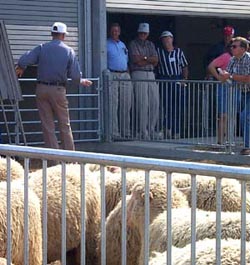Sheep Producers Flock to Sheeprofit Day
Sheep Producers Flock to Sheeprofit Day

Sheep producers from across the state flocked to the 37th Annual University of Kentucky Sheeprofit Day to hear the experts, ask questions and indulge themselves in a delicious dinner of smoked lamb. While some had years of experience under their belts, others were just getting into the business. All were intent on learning new techniques for improving production.
“Most of these people have been to Sheeprofit Day for as long as I’ve been coming,” said Debra Aaron, a professor in the UK College of Agriculture Department of Animal and Food Sciences. “They come back every year. It’s not only an educational activity, but it’s a social activity for them.”
Oldham County friends Sherry Parker and Joyce Keibler attended the event together, hoping to take home some useful tips to improve their production. Keibler is just getting started, while Parker has three lambing seasons to her credit.
“I’m just trying to learn everything I can,” said Keibler, “because I had sheep when I was a little kid, but I mean, it wasn’t anything like it is today.”
This year, the event’s focus was on the producers themselves.
“We’re kind of focusing on looking specifically at what we thought the producer would like to know – what they need to know about some of the things that are currently hot topics,” Aaron said.
Those hot topics included a scrapie eradication program, the ram’s contribution to production, the national animal identification program and marketing options. Experts in the field came from as far away as Minnesota to share their insights with the farmers.
Sheep numbers are increasing across the state, and more farmers are beginning to look at this as a supplement to their other crops or livestock. Don Ely, UK professor of Animal and Food Sciences, said that much of the interest had to do with a strong market for lambs.
“The price of lambs has been really good in the last two or three years. So profitability is better,” he said.
“In Kentucky, the ethnic market has been really, really good for us. It’s very strong and I think there’s a market for those lambs,” Aaron agreed. “I think, also some people may have raised tobacco all of their lives and they’re looking at something they could do to offset some of that.”
Parker added another reason to the list.
“You can run a lot more sheep per acre than you can cattle. It’s a smaller investment,” she said.
“And you can increase your herd a lot more rapidly with sheep than you can with cattle,” Keibler added. “I mean, sometimes they (cows) have twins, but rarely. These guys (ewes) have multiple births.”
Participants also had the opportunity to take a hay ride to visit a tobacco barn that was converted to a sheep facility. Discussions continued on topics such as setting up creep feeders, feeding ewes, pasture rotation and pens. The day concluded with dinner followed by a question and answer session with the experts.
Aaron said that they wanted to share practical knowledge about “things that you can do that don’t really cost an awful lot and may not be real pretty, but they work.”
